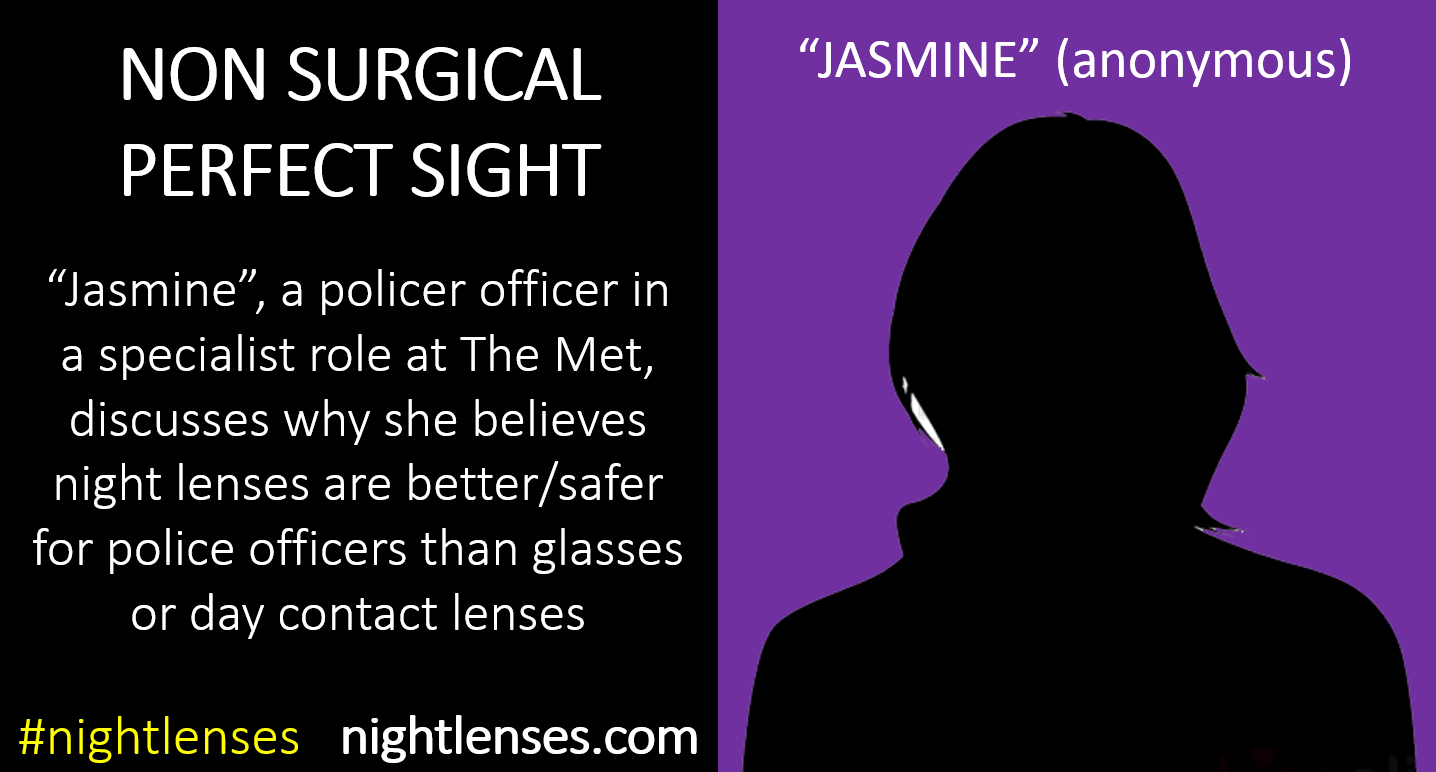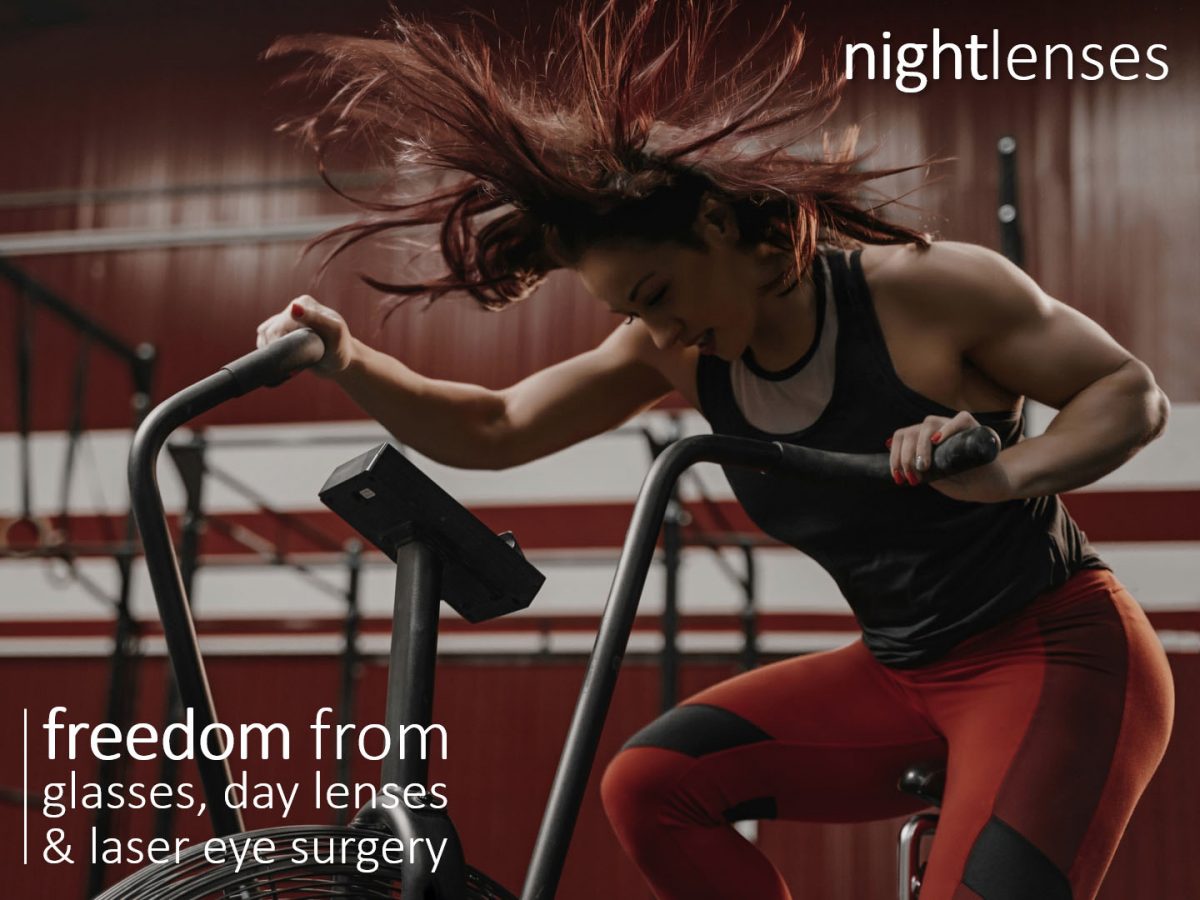Part 1: We caught up with officer “John” (keeping it anonymous), a 47-year-old who spent 13 years on the front lines with TSG in Northern Ireland. John recently got hooked up with night lenses, and they’ve turned his life around. He wishes he’d known about them earlier, for both work and home life. His take is that police work is better and safer with night lenses than with daytime lenses. Check out John’s interview HERE.
Part 2: We followed up with Jasmine (not her real name), a police officer in a specialized role in The Met and a night lens wearer. You can read the transcript of her interview below or watch the interview on YouTube HERE.

Absolutely. I got the news about needing glasses when I was a teenager, which I wasn’t thrilled about. So, at 16, I made the switch to contact lenses. By 18, I joined The Met, and at 21, I opted for laser eye surgery. I enjoyed about 12 to 13 years of great vision. As my eyesight gradually declined, I found myself at a crossroads – should I go back to contacts or glasses? That’s when I stumbled upon night lenses. To be honest, I didn’t know much about them and was a bit skeptical, but the more I delved into it, the more it seemed like a viable option. I loved the idea – it was foolproof, really. All I had to do was pop in some lenses before bed, sleep, and wake up with corrected vision. It was hard to wrap my head around it initially, thinking it couldn’t be right, but I was pleasantly surprised to find my vision perfect by morning. It felt like I was wearing glasses or contacts, but without anything in my eyes! It’s fantastic not to deal with either and still have flawless vision all day.
Given your shift work, was there any concern about using night lenses?
No worries at all. If I’m on a night shift and crashing during the day, I just put in my night lenses. When I wake up, I take them out, and then I’ve got clear vision throughout the night. Regardless of the shift, as long as I wear them during my sleep – a minimum of 4 hours to see the difference – that’s enough for a whole day of perfect vision. I’ll probably go a day and a half before feeling the need to put them back in. The game-changer is that every day I can go to work without the fear of my contacts dropping out. Especially during extended duty periods or last-minute calls – a common scenario for most police officers – you might end up doing a 20 or 24-hour shift. You’re tired, eyes dry, constant blinking – it’s great not to worry about any of that or having to use eye drops. Discovering night lenses was really a game-changer for me.
In our previous interview with another police officer we called ‘John’ from TSG in Belfast, who started with night lenses in his late 40s, he mentioned the same thing. In the middle of a hectic situation, he’d find himself stuck in the back of a van, unable to get out – the problem being his lenses getting itchy and dry. Looking back, he agreed that having perfect sight and nothing in his eyes in those situations would have been a huge plus. Let’s dive into your operational role. You mentioned two parts – the active operational days and then the specialized role. Reflecting on the operational side where CS gas might come into play – if you had night lenses instead of day lenses at the time, do you think things would have been easier and better?
I’d absolutely recommend anyone considering day contact lenses to go for night lenses. If we had to deploy CS spray or PAVA nowadays, not worrying about the after-effects is a huge relief. Some people might be fine, but for me, it affected me as much as the person I was dealing with. So, it’s reassuring knowing you don’t have anything in your eyes that could be an extra irritant. I’d choose night lenses over day contact lenses any day, especially since you know PAVA won’t mess with your lenses afterward.

Absolutely! I’m into activities like HIIT and circuit training, which can be pretty high-impact. The best part is knowing I can dive into these workouts without fretting about losing my contact lenses. I don’t have to worry about them falling out mid-exercise. It’s especially great for high-impact stuff. Another perk is when I go swimming with my little girl. I can submerge my head underwater without the fear of not being able to see or losing a lens. No concerns about checking the clock or any issues with steam-up during running or other activities. I’ve been using night lenses for about seven years now, and I wouldn’t go back to daytime lenses. If I had known about them before my laser eye surgery, I probably would have chosen night lenses first. People often assume laser lasts 20 to 30 years, so they think they won’t need to worry about it until they’re in their 40s or 50s. But realizing that I had to explore alternatives less than 15 years later, knowing what I know now, I would have opted for night lenses first.
It’s interesting to hear your perspective on laser surgery, as many believe it’s a permanent solution. There are risks, with some experiencing floaters and other stress-inducing issues. You’ve been through both laser and night lenses. Are you suggesting that for those considering laser, night lenses are a good way to experience a glasses and contact lens-free life before potentially going for laser later?
Exactly! There’s always the option of laser later on. Another aspect I appreciate is that my prescription has remained consistent over the years. I’ve been steady for the last seven years with night lenses, whereas with Lasik, I was slowly deteriorating. So, for those who are a bit hesitant about surgeries or view laser as a substantial commitment, trying night lenses is a great alternative. I wish I had known about them earlier.
In a previous conversation, we touched upon the term ‘myopia,’ and I found it amusing to inform you that you have myopia! [Jasmine laughs] For those listening who might not know, ‘myopia’ is the medical term for what we commonly call ‘short-sightedness,’ linked to eye diseases and detached retinas. First, do you think colleagues with short-sightedness should familiarize themselves with this term and understand its implications? Secondly, as a parent with myopia, should you consider the likelihood that your child might also have myopia?
Absolutely! Honestly, at the big, branded places on the high street, it’s usually referred to as ‘short-sight’ and ‘long-sight.’ They don’t often use the term ‘myopia.’ I didn’t know about myopia until recently. Short-sight is often downplayed as not too serious, fixable with contacts or glasses. However, when you realize it worsens over time and can lead to eye disease, it changes the perspective. I admit I was naive or didn’t think much about it before. Now that I’m more aware, I lean towards being cautious. It’s better to stay on top of this rather than being overly relaxed. There might be an underlying health issue that needs attention. Night lenses have been beneficial because my independent optometrist conducts extra check-ups annually, helping monitor any changes or issues in the back of my eyes. You might not get those same check-ups at some of the big high street chains – at least I didn’t. Having this comparison helps me gauge consistency or identify areas that may need further medical attention.
A quick shoutout to Jaimin Patel, your optometrist at Vision Eyecare, who is a fantastic example of a dedicated independent optometrist. Jasmine, being similar in age, we need basic info to understand our options and the changes in our eyes as we age. This is why I encourage all short-sighted individuals to ask for a MyopiaChat during their optician visits.
Finally, a two-part question. Would you recommend night lenses? Secondly, similar to ‘John’ from TSG, is it safer for police officers fitted with night lenses (less than -6D) to use them over day lenses in their roles?
Absolutely, I would recommend night lenses. For police officers doing operational or frontline policing, it’s safer for several reasons. In confrontational situations, you’re not thinking about your contact lens flying out if you get punched. When using PAVA or other options, knowing how it’ll affect you is crucial. During extended shifts, if you’re wearing daily lenses, after 18 – 20 hours, you start feeling the effects – dry eyes, thinking “I need to put drops in.” It’s nice not to stress about that. Not worrying about dry, itchy eyes or feeling tired and constantly blinking is a relief. For these reasons, I’d say give night lenses a try. My optometrist, Jaimin, did a great job. It took time to get it right because night lenses are individualized for each person. But once he nailed it for me, I’m glad I did it, enjoying years of perfect vision without worrying about glasses. It doesn’t impact my personal, social, or work life. It’s a good balance for me.
Absolutely! I mentioned to you earlier that my teenage son’s life was transformed by night lenses, which is why I’m doing these interviews. He’s 17, a surfer, and if we hadn’t stabilized his myopia with night lenses, he might have progressed to -6 or -7, and he wouldn’t be able to see the waves without glasses or contacts. Now he surfs with confidence, so I fully agree that night lenses are truly remarkable!
Thank you so much for sharing your time and story; we really appreciate it.
Further info
